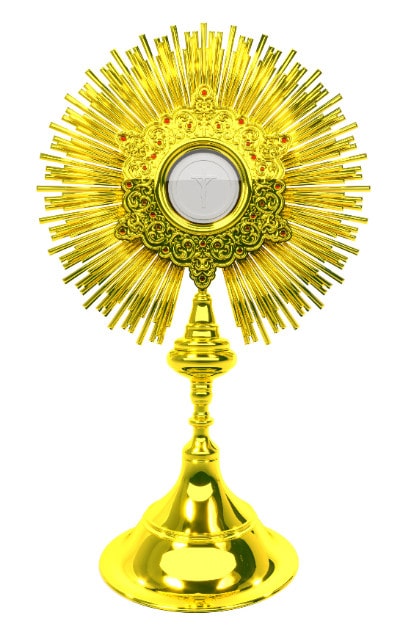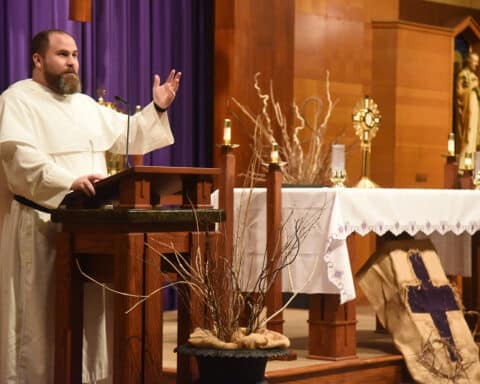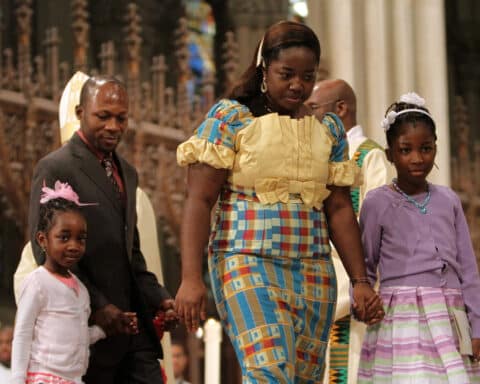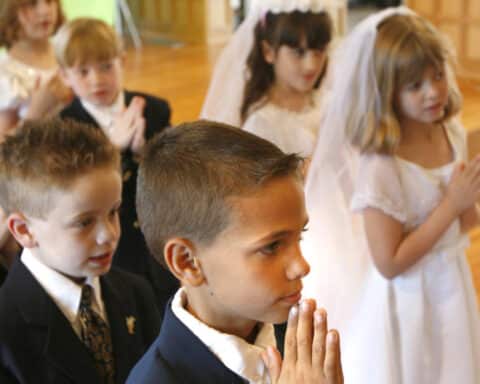The second reading for the Fourth Sunday of Advent reminds us that we are made to be saints, “called to be holy,” as St. Paul instructed the Romans 1:7. And this means no less than, like St. Paul himself, allowing Christ to live in us. It means making Mary’s fiat our own, bringing Christ into the world anew in our obedience to him who is our way, truth and life. Our entire lives are spent, or should be spent, preparing to be found “worthy to possess the heavenly Kingdom,” as the collect prayer at Mass on the First Sunday of Advent reminds us. But are we doing it?
Advent is an annual opportunity for a course correction — a time to attune ourselves more fully to our truest calling: preparing for the Lord when he comes again. And the Eucharist is the means to making this a reality in our lives. Taken together, they can be a powerful method of embracing this fundamental Christian undertaking, particularly relevant, perhaps, as the Church in the United States undertakes the nationwide Eucharistic Revival.
Living in the Kingdom
St. John the Baptist is a prominent figure during Advent. He played a central role in preparing the world for the coming of the Messiah through his call to repentance and conversion, so that, as the Gospel antiphon at Mass for the Second Sunday of Advent states, “all flesh shall see the salvation of God.” In consideration of John the Baptist’s singular significance, in the Gospel reading for the Third Sunday of Advent this year, we hear Christ say that “among those born of women there has been none greater than John the Baptist.”
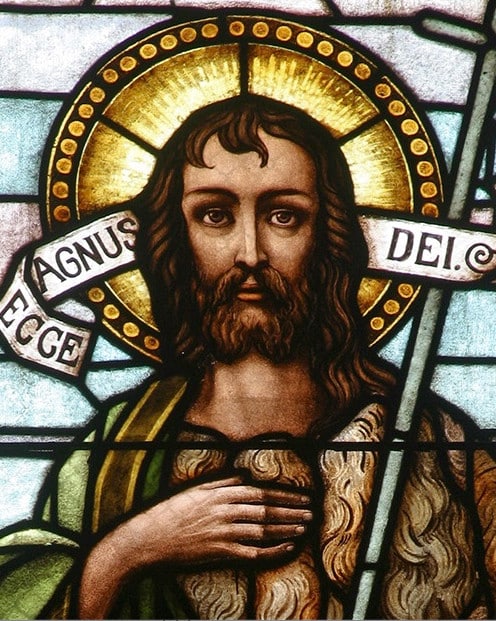
“Yet,” Christ cautioned — relevant to all of us — “the least in the kingdom of heaven is greater than he” (Mt 11:11). What could he mean by this? And what might it mean for us?
Like John the Baptist, we are also called to be forerunners of the Lord. While John set the stage for Christ’s salvific ministry, we are to announce the presence of Christ in our midst. Certainly, John’s greatness is bound up with his proclamation that “the kingdom of heaven is at hand!” (Mt 3:2). We get the picture, though, that one must be greater than announcing the kingdom’s immanence to be in the kingdom itself. Through his parables, Christ makes clear that words are not enough to live in the kingdom; action is necessary. Should we choose to live in the kingdom of heaven, we radically choose to give up everything, our very selves. It is then we can say, like Paul, “I live, no longer I, but Christ lives in me” (Gal 2:20). This is the life to which we are called, the life in which we must be found if we are to be worthy of heaven. And the Eucharist is the key.
Living by the Eucharist
If even the least in the kingdom of heaven needs to be found similar to Christ, the means for doing so has been provided by Christ in the Eucharist. As the “fount and apex of the whole Christian life” (Lumen Gentium, “Dogmatic Constitution of the Church,” No. 11), the Eucharist must be the foundation for our prayer and worship, but also requires our imitation and the conformity of our lives. In the Eucharist, we find the graces we need to achieve this goal. Christ identified himself as “the living bread that came down from heaven” and promised that “whoever eats this bread will live forever” (Jn 6:51).
But, as Advent reminds us, our judgment will come first. The Gospel reading from the First Sunday of Advent this year reminds us we “must be prepared, for at an hour you do not expect, the Son of Man will come” (Mt 24:44). In light of this, it is a consolation that the Lord has remained with us in the Eucharist.
While we await his coming, he waits for us to come to him, too, in every tabernacle and every monstrance. Blessed James Alberione, the founder of the Pauline Family who articulated a spirituality grounded in Eucharistic prayer, said that adoring Christ in the Eucharist is “the secret of our transformation in Christ: ‘Christ lives in me.'”
Living as Christ
How should our lives look if Christ lives in us? St. Paul, in the second reading for the First Sunday of Advent, exhorts us to “put on the Lord Jesus Christ” (Rom 13:14). This, of course, means that we conform to the Christian moral tradition. But it also means that the characteristics of Christ’s life come to define our own.
The first reading from the Second Sunday of Advent, Isaiah 11:1-10, describes this. It means the Lord’s Spirit rests upon us. The priest calls down the Holy Spirit in the Eucharistic prayer of the Mass, first upon the gifts of bread and wine to be transformed, but also on us who receive the sacred gifts, so that by the Spirit’s power we can be transformed into what we receive. As Pope Emeritus Benedict XVI explained: “through the working of the Spirit that Christ himself continues to be present and active in his Church, starting with her vital center which is the Eucharist” (Sacramentum Caritatis, No. 12).
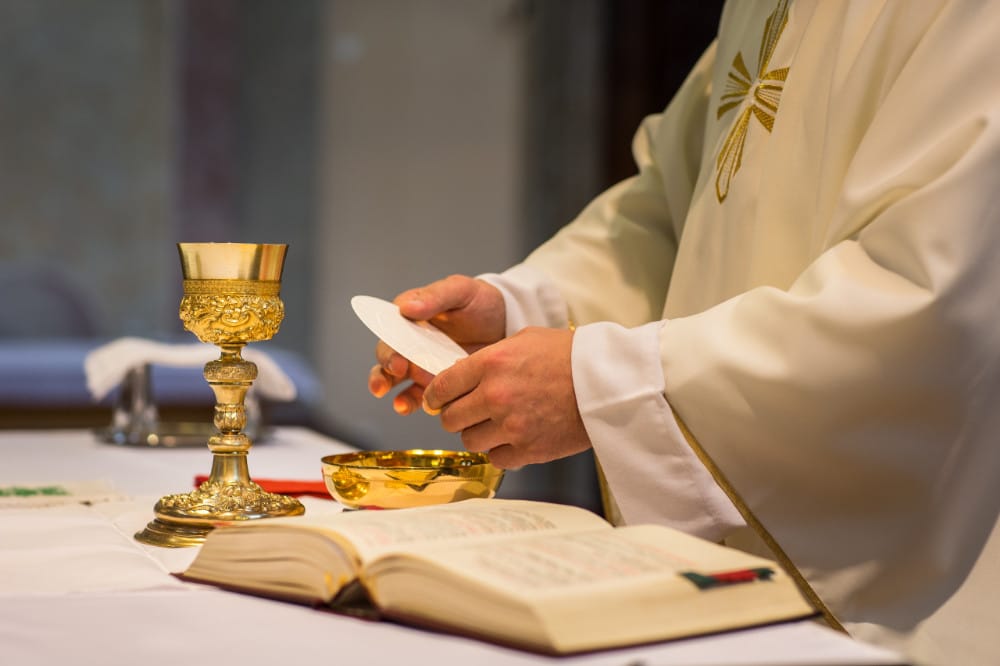
While Isaiah’s words are filled with multiplicity of meaning, the most readily apparent is the description of the coming Messiah. However, as members of Christ’s body through baptism, a bond renewed and intensified through our Eucharistic worship, these characteristics should describe us too. It should also be said that these are, at first reading, descriptions of the ideal Davidic king. We also share in the royal office of Christ who is the new, definitive and everlasting King of the Universe, “anointed” — as the Gospel antiphon for Mass on the Third Sunday of Advent borrows from Isaiah and Luke — “to bring glad tidings to the poor.”
Ripples of transformation begin by the Spirit’s power in the Eucharist. As the Spirit transforms the bread and wine, which becomes the body of Christ, so too the Spirit transforms us into members of that same body. And, receiving who we are to become, the Spirit — through our participation in Christ’s life — equips us to transform the world in Christ’s name.
The Second Vatican Council reiterates that “the laity, by their very vocation, seek the kingdom of God by engaging in temporal affairs and by ordering them according to the plan of God” (Lumen Gentium, No. 31). From Christ, we seek wisdom, understanding, counsel, strength, knowledge and fear of the Lord. If we are to be effective in the mission for which we have been sent from the Eucharist, these must define us.
St. Paul also speaks a word about what else we “put on” when we put on Christ (cf. Col 3:12-15, which is only an option for the first reading at Mass on the feast of the Holy Family, since it falls on a weekday this year). We are to be marked by compassion, kindness, humility, gentleness, patience, forgiveness, love, gratitude. The Eucharist is a school of these virtues, fueling our spiritual lives to adopt them as our own.
Living like Christ
The Eucharist — which is the summation and memorial of Christ’s character and virtue — makes present Christ’s saving passion, death, resurrection, and ascension. And it inserts us into this salvific drama. By receiving the Lord in the Eucharist, by gazing upon the Eucharistic host longing to be made like him, we come to understand the beauty, meaning and sensibility of Eucharistic living. In the Eucharist, we learn what it means to live like Christ: obediently making an oblation and sacrifice of our lives in service to God and our neighbor. We learn what it means to be faithful, to live by hope, to serve in charity. It is the Eucharist that teaches us to prepare for heaven, to prepare for the ultimate surrender, described so aptly by the late Cardinal Francis E. George, OMI: “The only thing we take with us when we die is what we have given away.”
Should Advent have any effect on our spiritual lives, it should be this reality above all else: to live Christ and to give Christ. It is only then that “we may share in the divinity of Christ,” as we pray in the collect of Mass on Christmas Day. It is only then that we can be found worthy of heaven. It is only then that Christ can live in us and be born anew in the world, that we can usher in Emmanuel’s reign, proclaiming with our lives: “God is with us.” It is only then that we can become saints.
Michael R. Heinlein is editor of OSV’s Simply Catholic. He writes from Indiana.


